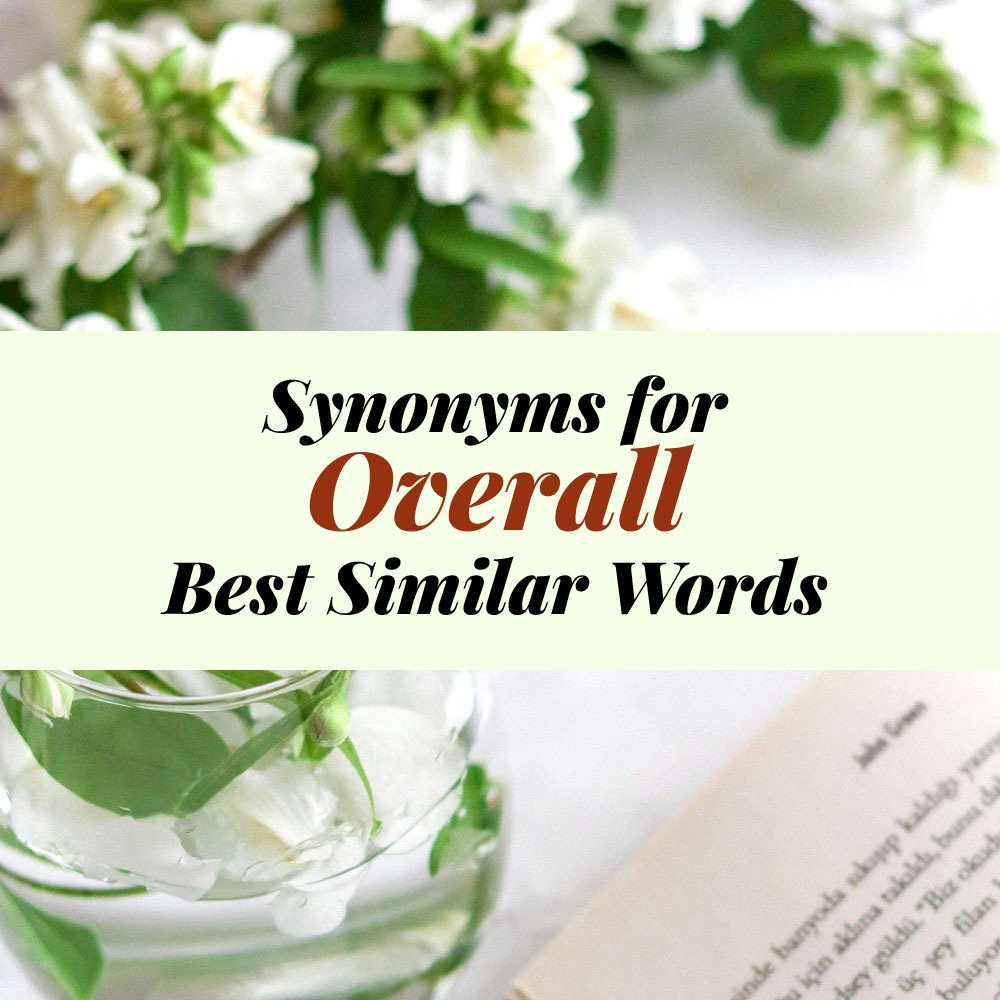When we want to explain something completely, we often use the word overall. However, there are many other ways to say it, such as generally, in general, all in all, or on the whole. These words can make your sentences more interesting and natural. In this article, we will explore 25 other ways to say overall with examples.
| Synonym | Meaning | Example |
|---|---|---|
| Generally | Most of the time, or in most cases | Generally, people like sunny weather. |
| In general | Speaking about most situations | In general, students enjoy holiday breaks. |
| All in all | Considering everything | All in all, the trip was a success. |
| On the whole | Looking at everything together | On the whole, the plan worked well. |
| Broadly | Considering large parts or main ideas | Broadly, the project was successful. |
| By and large | Considering most aspects | By and large, the event went smoothly. |
| Altogether | When everything is included | Altogether, we raised a lot of money. |
| As a whole | Considering all parts | As a whole, the team performed well. |
| In summary | Giving a short conclusion | In summary, the results were positive. |
| Collectively | Together, as a group | Collectively, the students improved their scores. |
| In essence | In the main point | In essence, the story teaches kindness. |
| On balance | Considering positive and negative points | On balance, the idea is worth trying. |
| Taking everything into account | Considering all details | Taking everything into account, the plan is safe. |
| Generally speaking | Speaking about most cases | Generally speaking, dogs are friendly animals. |
| In total | Counting everything together | In total, there were fifty participants. |
| Altogether now | When counting or combining things | Altogether now, we can see the full picture. |
| All things considered | Thinking about everything | All things considered, it was a good decision. |
| Overall speaking | When talking generally | Overall speaking, the project went well. |
| Summing up | Giving a short conclusion | Summing up, the results were positive. |
| In brief | Explaining in a short way | In brief, the plan worked. |
| On the whole, generally | Looking at everything broadly | On the whole, generally, the students succeeded. |
| In totality | Considering the full amount | In totality, the event was successful. |
| Overarchingly | Considering everything in a large sense | Overarchingly, the program met its goals. |
| From a general point of view | Looking from a broad perspective | From a general point of view, life is good. |
| In a nutshell | Explaining briefly | In a nutshell, the idea is helpful. |
Generally
Generally means most of the time or in most situations. It is used when you want to talk about what usually happens. This word is very helpful when describing habits, routines, or common results. You can use it to explain things that are true in general, without going into too much detail.
- Generally, people enjoy sunny weather.
- Generally, students finish their homework on time.
- Generally, dogs are friendly with children.
In general
In general is used to talk about most situations. It helps you explain something that is true for most cases, not just one example. This phrase works well when summarizing or giving a broad view of something. It helps your sentence sound complete and balanced.
- In general, students enjoy holiday breaks.
- In general, cats like to sleep during the day.
- In general, people prefer to drink water instead of soda.
All in all
All in all means considering everything. It is used when you want to give a summary of a situation or experience. This phrase is very useful when you want to share an opinion or final thought. It shows that you have looked at all parts before deciding.
- All in all, the trip was a success.
- All in all, the movie was entertaining.
- All in all, the food at the restaurant was good.
On the whole
On the whole means looking at everything together. It is used when giving a general opinion about a situation. This phrase is useful for making conclusions or summaries. You can use it to talk about the general effect or result of something.
- On the whole, the plan worked well.
- On the whole, the students did their best.
- On the whole, the weather was nice during the vacation.
Broadly
Broadly means considering the main parts or big picture. It is used to give a general explanation or summary. This word is helpful when talking about something in a wide or general way. It shows that you are not focusing on small details but on the overall idea.
- Broadly, the project was successful.
- Broadly, people enjoy music in all forms.
- Broadly, the city is growing fast.
By and large
By and large means considering most aspects. It is used to give a general opinion or summary. This phrase helps you show that you are looking at the big picture. It is useful when explaining how something usually happens or how things generally are.
- By and large, the event went smoothly.
- By and large, students like online learning.
- By and large, people enjoy weekend trips.
Altogether
Altogether means when everything is included. It is used to give a total or complete view of something. This word is helpful for adding all parts or elements together. It is useful when you want to show the final result or total sum.
- Altogether, we raised a lot of money.
- Altogether, the books cost fifty dollars.
- Altogether, the team scored ten goals.
As a whole
As a whole means considering all parts together. It is used when talking about a group or something complete. This phrase helps you explain a situation or object fully. It is useful when you want to give a general opinion about the complete thing.
- As a whole, the team performed well.
- As a whole, the city is safe for tourists.
- As a whole, the class improved their grades.
In summary
In summary means giving a short conclusion. It is used to summarize important points. This phrase helps your reader understand the main idea quickly. It is useful when you want to finish your explanation or give a quick overview.
- In summary, the results were positive.
- In summary, the meeting was productive.
- In summary, the book teaches important lessons.
Collectively
Collectively means together, as a group. It is used when talking about the total effect of people or things together. This phrase is helpful when showing a group result or action. It is useful for expressing something that comes from many parts acting as one.
- Collectively, the students improved their scores.
- Collectively, the team solved the problem.
- Collectively, the workers finished the project on time.
In essence
In essence means in the main point. It is used when explaining the core idea of something. This phrase is helpful when simplifying a complex situation. It is useful when you want to show the real meaning or main purpose of something.
- In essence, the story teaches kindness.
- In essence, the plan is very simple.
- In essence, the lesson is about honesty.
On balance
On balance means considering both positive and negative points. It is used to show that you have looked at the situation carefully. This phrase is helpful when giving a final opinion or judgment. It is useful for weighing the pros and cons before deciding.
- On balance, the idea is worth trying.
- On balance, the trip was enjoyable.
- On balance, the project achieved its goals.
Taking everything into account
Taking everything into account means considering all details. It is used when evaluating a situation carefully. This phrase is helpful when giving a thoughtful conclusion. It is useful for showing that you looked at all factors before deciding.
- Taking everything into account, the plan is safe.
- Taking everything into account, the event was successful.
- Taking everything into account, the decision was fair.
Generally speaking
Generally speaking means speaking about most cases. It is used when explaining something that is usually true. This phrase helps to give a broad perspective. It is useful for making general statements about situations or behavior.
- Generally speaking, dogs are friendly animals.
- Generally speaking, students like breaks during school.
- Generally speaking, people enjoy spending time with family.
In total
In total means counting everything together. It is used to give the complete number or amount. This phrase is helpful when summarizing numbers, amounts, or things. It is useful for showing the final result clearly.
- In total, there were fifty participants.
- In total, the cake had five layers.
- In total, the journey took three days.
Altogether now
Altogether now is used when counting or combining things. It helps to show the final amount or result. This phrase is useful when summarizing parts or explaining the full picture. It makes the sentence feel complete and included.
- Altogether now, we can see the full picture.
- Altogether now, the students understand the lesson.
- Altogether now, the team has finished their work.
All things considered
All things considered means thinking about everything. It is used when giving a judgment after seeing all details. This phrase is helpful for expressing a fair opinion. It is useful when summarizing a situation fully.
- All things considered, it was a good decision.
- All things considered, the event was a success.
- All things considered, the movie was enjoyable.
Overall speaking
Overall speaking means when talking generally. It is used to give a general opinion about a topic. This phrase is helpful for sharing an overall view. It is useful for giving a complete idea of the situation.
- Overall speaking, the project went well.
- Overall speaking, the class performed admirably.
- Overall speaking, the plan is effective.
Summing up
Summing up means giving a short conclusion. It is used to summarize the important points. This phrase is helpful for concluding a topic. It is useful when giving the main idea in a few words.
- Summing up, the results were positive.
- Summing up, the meeting was productive.
- Summing up, the lesson was useful.
In brief
In brief means explaining in a short way. It is used when summarizing quickly. This phrase is helpful for making your point fast. It is useful when giving a short overview or conclusion.
- In brief, the plan worked.
- In brief, the trip was fun.
- In brief, the project is complete.
On the whole, generally
On the whole, generally means looking at everything broadly. It is used when giving an overall opinion about most things. This phrase is helpful for summarizing general results. It is useful when showing what usually happens or what is true in most cases.
- On the whole, generally, the students succeeded.
- On the whole, generally, the team did well.
- On the whole, generally, the plan was successful.
In totality
In totality means considering the full amount. It is used when giving a complete view of something. This phrase is helpful for including all parts or aspects. It is useful for showing the full effect or result.
- In totality, the event was successful.
- In totality, the team performed well.
- In totality, the lesson was helpful.
Overarchingly
Overarchingly means considering everything in a large sense. It is used when looking at the broad picture or overall effect. This phrase is helpful when explaining something very general. It is useful for showing that you are thinking about the big idea, not the details.
- Overarchingly, the program met its goals.
- Overarchingly, the city improved over time.
- Overarchingly, the students learned valuable lessons.
From a general point of view
From a general point of view means looking from a broad perspective. It is used to explain something in a wide sense. This phrase is helpful for giving a general opinion. It is useful for summarizing what usually happens or what is common.
- From a general point of view, life is good.
- From a general point of view, the plan is fair.
- From a general point of view, the students did well.
In a nutshell
In a nutshell means explaining briefly. It is used to give the main idea in a few words. This phrase is helpful for summarizing quickly. It is useful when you want to give a final opinion or conclusion clearly.
- In a nutshell, the idea is helpful.
- In a nutshell, the project succeeded.
- In a nutshell, the trip was enjoyable.

Final Thoughts
Using different ways to say overall can make your writing and speaking more interesting. Words like generally, all in all, and in a nutshell help you explain things fully. They allow you to share ideas clearly and completely while keeping your sentences fresh and engaging. Practice these words to improve your daily communication skills.









